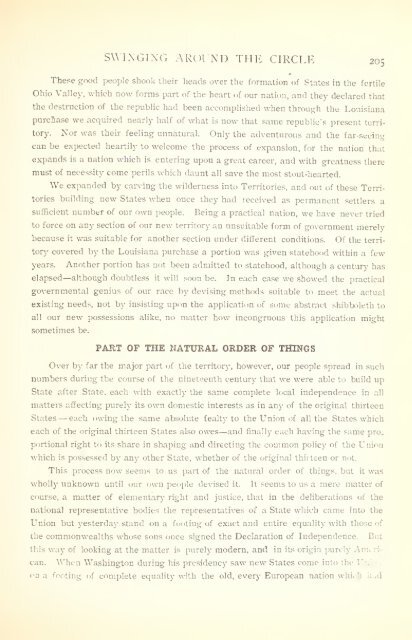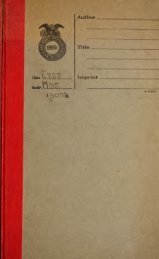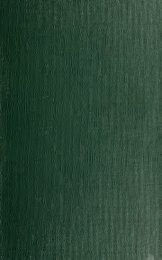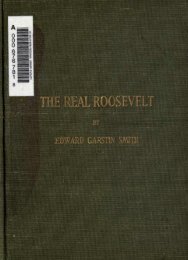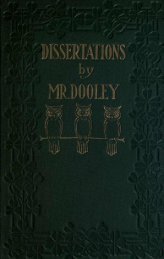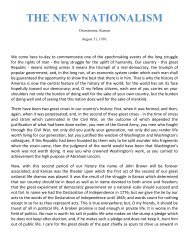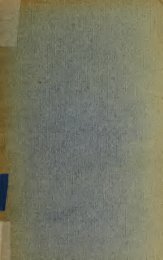- Page 1 and 2:
iHliiliiPliii I'lii; ^i;;.
- Page 7 and 8:
THE PRESIDENT IN HIS OFFICE Cop>Tig
- Page 9 and 10:
The Triumphant Life OF Theodore Roo
- Page 11 and 12:
INTRODUCTION President Roosevelt ha
- Page 13 and 14:
'INTRODUCTION 5 of dealing with som
- Page 15 and 16:
TABLE OF CONTENTS PAGE Introduction
- Page 17 and 18:
CONTENTS 9 CHAPTER XII THE MERGER D
- Page 19 and 20:
LIST OF ILLUSTRATIONS Portrait of T
- Page 21 and 22:
THEODORE ROOSEVELT WHAT HE HAS ACCO
- Page 23 and 24:
THEODORE ROOSEVELT 15 order. We hav
- Page 25 and 26:
* « # * # y I k jt ^ ^ ^ ^ J >fc ^
- Page 27 and 28:
THEODORE ROOSEVELT 17 appointed. As
- Page 29 and 30:
THEODORE ROOSEVELT 19 States that i
- Page 31 and 32:
THEODORE ROOSEVELT 21 interests abr
- Page 33 and 34:
BIOGRAPHY OF THEODORE ROOSEVELT Roo
- Page 35 and 36:
BIOGRAPHY OF THEODORE ROOSEVELT 25
- Page 37 and 38:
BIOGRAPHY OF THEODORE ROOSEVELT 27
- Page 39:
BIOGRAPHY OF THEODORE ROOSEVELT 29
- Page 42 and 43:
32 THEODORE ROOSEVELT ists, the far
- Page 44 and 45:
THEODORE ROOSEVELT AT TWELVE YEARS
- Page 47 and 48:
CHAPTER I ROOSEVELT THE PRESIDENT G
- Page 49 and 50:
ROOSEVELT THE PRESIDENT 37 very men
- Page 51 and 52:
ROOSEVELT THE PRESIDENT 3g pardon o
- Page 53 and 54:
ROOSEVELT THE PRESIDENT 41 under co
- Page 55 and 56:
GETTING CLOSE TO THE PEOPLE 43 ous
- Page 57 and 58:
GETTING CLOSE TO THE PEOPLE 45 At e
- Page 59 and 60:
GETTING CLOSE TO THE PEOPLE 47 of t
- Page 61 and 62:
THE HERO OF SAN JUAN HILL Cninrigli
- Page 63 and 64:
GETTING CLOSE TO THE I'EOPLIC 49 pa
- Page 65 and 66:
GETTING CLOSE TO THE PEOPLE 51 and
- Page 67 and 68:
THE LAUNCHING OF A ATAN 53 "But tho
- Page 69 and 70:
THE LAUNCHING OF A MAN 55 considera
- Page 71 and 72:
THE LAUNCHING OF A MAN 5; earliest
- Page 73 and 74:
THE LAUNCHING OF A MAN 59 as they f
- Page 75 and 76:
THE LAUNCHING OF A MAN 6i entered u
- Page 77 and 78:
THE LAUNCHING OF A MAN 63 later fan
- Page 81 and 82:
THE HOME OE THE PRESIDENT 65 April
- Page 83 and 84:
THE HOME OF THE PRESIDENT 67 secret
- Page 85 and 86:
THE HOME OF THE PRESIDENT 69 Boston
- Page 87 and 88:
THE HOME OF THE PRESIDENT 71 is sma
- Page 89 and 90:
THE HOME OF THE PRESIDENT 73 them b
- Page 91 and 92:
THE HOME OF THE PRESIDENT 75 PUBLIC
- Page 93 and 94:
CHAPTER V DAILY LIFE AT THE WHITE H
- Page 95 and 96:
DAILY LIFE AT THE WHITE HOUSE 79 ar
- Page 98 and 99:
From Stereograph, copjTigbt by I'nd
- Page 100 and 101:
82 DAILY LIFE AT THE WHITE HOUSE So
- Page 102 and 103:
84 DAILY LIFE AT THE WHITE HOUSE se
- Page 104 and 105:
85 DAILY LIFE AT THE WHITE HOUSE th
- Page 106 and 107:
88 LIFE IN THE WEST man,' but a bro
- Page 108 and 109:
90 LIFE IN THE WEST camp early in t
- Page 110 and 111:
92 LIFE IN THE WEST A LONG SHOT Upo
- Page 112 and 113:
94 LIFE IN THE WEST ish hue of the
- Page 114:
96 LIFE IN THE WEST to the prairie;
- Page 118 and 119:
98 ROOSEVELT THE REFORMER the degra
- Page 120 and 121:
100 ROOSEVELT THE REFORMER spoils p
- Page 122 and 123:
102 ROOSEVELT THE REFORMER est}', c
- Page 124 and 125:
104 ROOSEVELT THE REFORMER the crit
- Page 126 and 127:
io6 THE ROUGH RIDERS believed he co
- Page 128 and 129:
108 THE ROUGH RIDERS the weary, mon
- Page 130 and 131:
,10 THE ROUGH RIDERS Just before le
- Page 132 and 133:
112 THE ROUGH RIDERS squadron. Afte
- Page 134 and 135:
o I— g 2 S D O.E s i s -^- 3 O .a
- Page 136 and 137:
114 THE ROUGH RIDERS airy, one man
- Page 138 and 139:
Ii6 THE ROUGH RIDERS the lines, fol
- Page 140 and 141:
Ii8 THE ROUGH RIDERS "By this time
- Page 142 and 143:
120 THE ROUGH RIDERS at the time, a
- Page 144 and 145:
122 THE ROUGH RIDERS trenches at ni
- Page 146 and 147:
124 GOVERNOR OF NEW YORK velt was l
- Page 148 and 149:
126 GOVERNOR OF NEW YORK of inspect
- Page 150 and 151:
128 GOVERNOR OF NEW YORK THZ FRIEND
- Page 152 and 153:
Q Z < H a: o < z o < a. UJ z o H o
- Page 154 and 155:
130 HOW ROOSEVELT BECAME PRESIDENT
- Page 156 and 157:
132 HOW ROOSEVELT BECAME PRESIDENT
- Page 158 and 159:
134 HOW ROOSEVELT BECAME PRESIDENT
- Page 160 and 161:
136 HOW ROOSEVELT BECAME PRESIDENT
- Page 162 and 163:
138 THE PANAMA CANAL wall, on the A
- Page 164 and 165:
140 THE PANAMA CANAL treaty was per
- Page 166 and 167:
142 THE PANAMA CANAL been in Europe
- Page 168 and 169:
144 THE PANAMA CANAL OPINIONS OF NO
- Page 170 and 171:
o zUl Q 3- H flj C WE E" C (J fy
- Page 172 and 173:
146 THE PANAMA CANAL sovereignty. H
- Page 174 and 175:
CHAPTER XII THE MERGER DECISION The
- Page 176 and 177:
I50 THE MERGER DECISION brought in
- Page 178 and 179:
152 THE MERGER DECISION competition
- Page 180 and 181:
154 THE MERGER DECISION of Addyston
- Page 182 and 183:
156 THE PRESIDENT STARTS ON HIS TRI
- Page 184 and 185:
158 THE PRESIDENT STARTS ON HIS TRI
- Page 186:
i6o THE PRESIDENT STARTS ON HIS TRI
- Page 189 and 190: THE PRESIDENT STARTS ON HIS TRIl' i
- Page 191 and 192: THE PRESIDENT STARTS ON HIS TRIT 16
- Page 193 and 194: THE PRESIDKNI STARTS ON HIS LRU' ,6
- Page 195 and 196: THE PRESIDENT STARTS UN HIS TRIP 16
- Page 197 and 198: THE PRESIDENT STARTS ON HIS TRIP 16
- Page 199 and 200: THE PRESIDENT STARTS ON HIS TRIP 17
- Page 201 and 202: THE PKESlDEiNT STARTS (,JN IIIS TRI
- Page 203 and 204: THE PRESIDENT STARTS ON HIS TRIP 17
- Page 206 and 207: 5>. < ti z o N a: < -6 2 2 O >- 2 <
- Page 208 and 209: 178 THE PRESIDENT STARTS ON HIS TRI
- Page 210 and 211: i8o THE PRESIDENT STARTS ON HIS TRI
- Page 212 and 213: 1 82 WESTWARD HO! eral lines of his
- Page 214 and 215: i84 WESTWARD HO: Philippine people
- Page 216 and 217: i86 WESTWARD HO! will appear to dem
- Page 218 and 219: 1 88 WESTWARD HO! if he keeps in cl
- Page 220 and 221: I go WESTWARD HO! ally to declare w
- Page 222: ig2 WESTWARD HO! President departed
- Page 226 and 227: a: < o X a: o H < -° a c " o 2 »
- Page 228 and 229: 194 WESTWARD HO! The government is
- Page 230 and 231: 196 WESTWARD HO: feet in the air. H
- Page 232 and 233: 198 WESTWARD HO! the station platfo
- Page 234 and 235: CHAPTER XV SWINGING AROUND THE CIRC
- Page 236 and 237: 202 SWINGING AROUND THE CIRCLE smil
- Page 240 and 241: 2o6 SWINGING AROUND THE CIRCLE colo
- Page 242 and 243: 2oS SWINGING AROUND THE CIRCLE this
- Page 245 and 246: HON CHARLES WARREN FAIRBANKS Republ
- Page 247 and 248: SWINGING AROUND THE CIRCLE 209 Army
- Page 249 and 250: SWINGING AROLND THE CIRCLE 211 wher
- Page 251 and 252: SWINGING AROUND THE CIRCLE 213 A PA
- Page 253 and 254: SWINGING AROUND THE CIRCLE 215 line
- Page 255 and 256: SWINGING AROUND THE CIRCLE 217 Stop
- Page 257 and 258: SWINGING AROUND THE CIRCLE 219 SALT
- Page 259 and 260: SWINGING AROUND THE CIRCLE 221 the
- Page 261 and 262: SWINGING AROUND THE CIRCLE 223 larg
- Page 263 and 264: ^ ^ c a o I T) o ° _
- Page 267 and 268: THE CONVENTION ASSEMBLES 225 govern
- Page 269 and 270: THE CONVENTION ASSEMBLES 227 from t
- Page 271 and 272: THE CONVENTION ASSEMBLES 229 our gr
- Page 273 and 274: THE CONVENTION ASSEMBLES 231 PRACTI
- Page 275 and 276: THE CONVENTION ASSEMBLES 233 subord
- Page 277 and 278: THE CONVENTION ASSEMBLES 235 Honda,
- Page 279 and 280: THE CONVENTION ASSEMBLES 237 None c
- Page 281 and 282: THE CONVENTION ASSEMBLES 239 Venezu
- Page 283 and 284: WII^LIAM 15. ALLISON XTNITED STATE>
- Page 285 and 286: NELSON M'. ALDRICII RHODE ISLAXI>
- Page 287 and 288: THE CONVENTION ASSEMBLES 241 the co
- Page 289 and 290:
THE CONVENTION ASSEMBLES 243 free i
- Page 291 and 292:
THE CONVENTION ASSEMBLES 245 Cannon
- Page 293 and 294:
CHAPTER XVII THE SECOND DAY Chairma
- Page 295 and 296:
THE SECOND DAY 249 heartily indorse
- Page 297 and 298:
THE SECOND DAY 251 OEOWTH OF THE PO
- Page 299 and 300:
THE SECOND DAY 253 Theodore Rooseve
- Page 301 and 302:
THE SECOND DAY 255 How much? Ob, a
- Page 303 and 304:
THE SECOND DAY 257 GREAT THINGS REM
- Page 305 and 306:
THE SECOND DAY 259 than we treat th
- Page 307 and 308:
THE SECOND DAY 261 Secretary of Sta
- Page 309 and 310:
THE REPUBLICAN PLATFORM J63 was thr
- Page 311 and 312:
THE REPUBLICAN PLATFORM 265 cratic
- Page 313 and 314:
THE REPUBLICAN PLATEORM 267 he has
- Page 315 and 316:
THE CANDIDATES NOMINATED 269 mounte
- Page 317 and 318:
THE CANDIDATES NOMINATED 271 remove
- Page 319 and 320:
ALBKRT J. REVERTDOK U>'ITED STATI-:
- Page 321 and 322:
THE CANDIDATES NOMINATED 273 and sp
- Page 323 and 324:
THE CANDIDATES NOMINATED 275 Govern
- Page 325 and 326:
THE CANDIDATES NOMINATED itj Gentle
- Page 327 and 328:
THE CANDIDATES NOMINATED 279 THE PE
- Page 329 and 330:
THE CANDIDATES NOMINATED 281 MR. KN
- Page 331 and 332:
THE CANDIDATES NOMINATED 283 best y
- Page 333 and 334:
THE CANDIDATES NOMINATED 285 sympat
- Page 335 and 336:
THE CANDIDATES NOMINATED 287 Mr. Ch
- Page 337 and 338:
UNITED STATES SENATOR FROM MAINK
- Page 339 and 340:
THE CANDIDATES NOMINATED 289 Our he
- Page 341 and 342:
THE CANDIDATES NOMINATED 291 On the
- Page 343 and 344:
THE CANDIDATES NOMINATED 293 Anothe
- Page 345 and 346:
THROUGH ONE ADMINISTRATION 295 spok
- Page 347 and 348:
THROUGH ONE ADMINISTRATION 297 tori
- Page 349 and 350:
THROUGH ONE ADMINISTRATION 299 More
- Page 351 and 352:
THROUGH ONE ADMINISTRATION 301 ber
- Page 353:
THROUGH ONE ADMINISTRATION 303 A DI
- Page 356 and 357:
3o6 BIOGRAPHY OF HON. CHARLES W. FA
- Page 358 and 359:
3o8 BIOGRAPHY OF HON. CHARLES W. FA
- Page 360 and 361:
310 BIOGRAPHY OF HON. CHARLES W. FA
- Page 362 and 363:
312 BIOGRAPHY OF HON. CHARLES W. FA
- Page 364 and 365:
314 BIOGRAPHY OF HON. CHARLES W. FA
- Page 366 and 367:
CHAPTER XXII LETTERS OF PRESIDENT R
- Page 368 and 369:
3i8 LETTERS OF PRESIDENT ROOSEVELT
- Page 370 and 371:
320 LETTERS OF PRESlDEiXT ROOSEVELT
- Page 372 and 373:
vEnFIELD PROCTOR \i;rmont
- Page 374 and 375:
322 LETTERS OF PRESIDENT ROOSEVELT
- Page 376 and 377:
324 LETTERS OF PRESIDENT ROOSEVELT
- Page 378 and 379:
326 LETTERS OF PRESIDENT ROOSEVELT
- Page 380 and 381:
328 LETTERS OF PRESIDENT ROOSEVELT
- Page 382 and 383:
330 LETTERS OF PRESIDENT ROOSEVELT
- Page 384 and 385:
332 SPEECHES OF THEODORE ROOSEVELT
- Page 386 and 387:
334 SPEECHES OF THEODORE ROOSEVELT
- Page 388 and 389:
336 SPEECHES OF THEODORE ROOSEVELT
- Page 390 and 391:
WILLIAM McKINLEY.
- Page 392 and 393:
338 SPEECHES OF THEODORE ROOSEVELT
- Page 394 and 395:
340 SPEECHES OF THEODORE ROOSEVELT
- Page 396 and 397:
342 SPEECHES OF THEODORE ROOSEVELT
- Page 398 and 399:
344 SPEECHES OF THEODORE ROOSEVELT
- Page 400 and 401:
346 SPEECHES OF THEODORE ROOSEVELT
- Page 402 and 403:
348 SPEECHES OF THEODORE ROOSEVELT
- Page 404 and 405:
350 SPEECHES OF THEODORE ROOSEVELT
- Page 406 and 407:
352 SPEECHES OF THEODORE ROOSEVELT
- Page 408 and 409:
3S4 SPEECHES OF THEODORE ROOSEVELT
- Page 410 and 411:
355 SPEECHES OF THEODORE ROOSEVELT
- Page 412 and 413:
358 SPEECHES OF THEODORE ROOSEVELT
- Page 414 and 415:
36o SPEECHES OF THEODORE ROOSEVELT
- Page 416 and 417:
362 SPEECHES OF THEODORE ROOSEVELT
- Page 418 and 419:
364 SPEECHES OE THEODORE ROOSEVELT
- Page 420 and 421:
366 SPEECHES OF THEODORE ROOSEVELT
- Page 422 and 423:
368 SPEECHES OF THEODORE ROOSEVELT
- Page 424 and 425:
370 SPEECHES OF THEODORE ROOSEVELT
- Page 426 and 427:
372 SPEECHES OF THEODORE ROOSEVELT
- Page 428 and 429:
374 SPEECHES OF THEODORE ROOSEVELT
- Page 430 and 431:
376 SPEECHES OF THEODORE ROOSEVELT
- Page 432 and 433:
378 SPEECHES OF THEODORE ROOSEVELT
- Page 434 and 435:
3So EXTRACTS FROM THE PRESIDENT'S M
- Page 436 and 437:
382 EXTRACTS FROM THE PRESIDENT'S M
- Page 438:
*432 EXTRACTS FROM THE PRESIDENT'S


